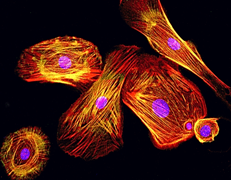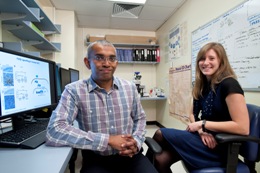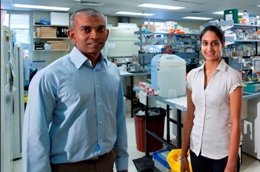22 December 2015
 Researchers at Adelaide’s Centre for Cancer Biology (CCB) have discovered that inhibiting a particular protein in the skin can accelerate the healing of wounds.
Researchers at Adelaide’s Centre for Cancer Biology (CCB) have discovered that inhibiting a particular protein in the skin can accelerate the healing of wounds.
The significant discovery has been published today in the peer-reviewed international scientific journal Developmental Cell.
Senior author Dr Michael Samuel says chronic wounds – injuries to the skin that fail to heal properly within three months – affect hundreds of millions of people around the world and cost the Australian economy $2.6 billion a year.
“When skin is wounded, the first priority of healing is to close the wound quickly to reduce the risk of infection,” Dr Samuel says.
“However, before this can be done, a scaffold needs to be set up to support the new skin, quite like when building a house. But making this scaffold is a slow process.”
 Dr Samuel and his team have discovered a way to speed up the process of building this scaffold, by inhibiting a protein called 14-3-3ζ.
Dr Samuel and his team have discovered a way to speed up the process of building this scaffold, by inhibiting a protein called 14-3-3ζ.
“Interestingly, 14-3-3ζ is present at very high levels in chronic non-healing wounds like, for example diabetic wounds, suggesting that this may be the reason chronic wounds heal so slowly,” he says.
“The next step of our research is to find out whether inhibiting 14-3-3ζ can be used to help people with chronic non-healing wounds to heal their wounds quickly.”
The research was led by Dr Michael Samuel and his team including Dr Jasreen Kular and Kaitlin Scheer in the Tumour Microenvironment Laboratory at the CCB, a Medical Research Institute created by an alliance between UniSA and SA Pathology.
The work also involved colleagues from UniSA’s Future Industries Institute and the Kinghorn Cancer Centre & Garvan Institute of Medical Research.
 UniSA Vice Chancellor Professor David Lloyd says this latest research is a great example of how the CCB’s specialist knowledge in basic cell biology has important applications across a broad range of medical settings.
UniSA Vice Chancellor Professor David Lloyd says this latest research is a great example of how the CCB’s specialist knowledge in basic cell biology has important applications across a broad range of medical settings.
“Chronic wounds seriously impact on a sufferer’s quality of life, affecting their productivity and mobility,” Prof Lloyd says.
“I congratulate the CCB on this latest work and look forward to the next steps of the research ultimately helping those suffering from chronic wounds.”
The full article can be read online at Developmental Cell.
Interview: Michael Samuel office (08) 222 3356 mobile 0402 965 073 email Michael.Samuel@unisa.edu.au
Media contact: Kelly Stone office (08) 8302 0963 mobile 0417 861 832 email Kelly.stone@unisa.edu.au




